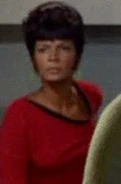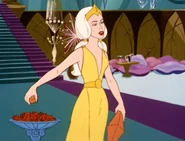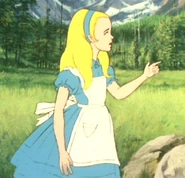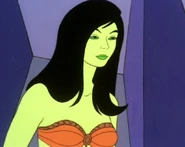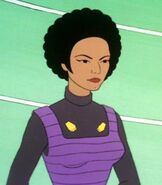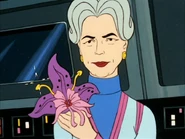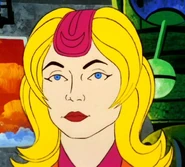(okay, i replaced tabloid stuff with the real facts) Tag: sourceedit |
|||
| Line 44: | Line 44: | ||
*Nichelle Nichols had decided to leave the original ''Star Trek'' series after the first season. Fed up with racist harassment and limitation, culminating with her learning that studio executives were withholding her fan mail, she submitted her resignation. She withdrew it when Dr. {{w|Martin Luther King, Jr.}} convinced her that her role was too important a cultural breakthrough to leave. |
*Nichelle Nichols had decided to leave the original ''Star Trek'' series after the first season. Fed up with racist harassment and limitation, culminating with her learning that studio executives were withholding her fan mail, she submitted her resignation. She withdrew it when Dr. {{w|Martin Luther King, Jr.}} convinced her that her role was too important a cultural breakthrough to leave. |
||
*Nichols is said to have wearied of the constantly used line: "''Hailing frequencies open, sir.''" After having to open hailing frequencies 14 times, her exact words were "''If I have to open hailing frequencies one more time I'll smash this goddamn console!''" (''[[The Trouble with Tribbles]]'') |
*Nichols is said to have wearied of the constantly used line: "''Hailing frequencies open, sir.''" After having to open hailing frequencies 14 times, her exact words were "''If I have to open hailing frequencies one more time I'll smash this goddamn console!''" (''[[The Trouble with Tribbles]]'') |
||
| + | *Gene Roddenberry offered Nichols (his former lover) a very generous contract at the beginning of the [[TOS Season 1|first season]]: a flat rate of $1,000 per episode, which was higher than the salary of [[DeForest Kelley]] [[James Doohan]] and [[George Takei]]. Also, her contract didn't set a limit for the number of episodes to appear in, which the aforementioned performers' contracts all did. However, [[Desilu]]'s legal department and the other producers soon got angry about this, especially since in the early episodes Uhura's role was basically uttering the "hailing frequencies" line a few times per episode, yet the studio payed her a thousands dollars for what was considered to be a "bit role". Soon, a new contract was negiotiated, with Nichols' salary reduced to $140 per day - which actually meant that if she needed to appear in all six or seven days of production, she would actually receive ''more'' money than with the previous offer. (''[[These Are the Voyages: TOS Season One]]'', ''[[Inside Star Trek: The Real Story]]'') |
||
| − | *Nichols only received the same salary for the original series as [[George Takei]] and [[Walter Koenig]] after [[Leonard Nimoy]] took the issue to the front office. {{TrekMovie.com|2014/07/31/koenig-leonard-nimoy-fought-to-get-nichelle-nichols-pay-equity-for-star-trek-nimoy-confirms/}} |
||
*She made both her first ({{TOS|The Corbomite Maneuver}}) and last ({{film|6}}) ''Star Trek'' appearances with [[DeForest Kelley]]. Both Nichols and Kelley filmed their first and last ''Star Trek'' scenes on {{d|24|May|1966}} and {{d|2|July|1991}} respectively. |
*She made both her first ({{TOS|The Corbomite Maneuver}}) and last ({{film|6}}) ''Star Trek'' appearances with [[DeForest Kelley]]. Both Nichols and Kelley filmed their first and last ''Star Trek'' scenes on {{d|24|May|1966}} and {{d|2|July|1991}} respectively. |
||
*Her younger brother, Thomas Nichols, committed suicide on March 26, 1997 with the {{w|Heaven's Gate (religious group)|Heaven's Gate}} cult members in Rancho Santa Fe, California near San Diego. |
*Her younger brother, Thomas Nichols, committed suicide on March 26, 1997 with the {{w|Heaven's Gate (religious group)|Heaven's Gate}} cult members in Rancho Santa Fe, California near San Diego. |
||
Revision as of 14:21, 22 March 2015
Template:Realworld Nichelle Nichols (born 28 December 1932; age 91) is an American actress from Robbins, Illinois. She is most famous for portraying communications officer Uhura in Star Trek: The Original Series, Star Trek: The Animated Series, and the first six Star Trek movies. She also provided the voices for a number of other characters on the animated series.
Early career and other roles
Hailing from Robbins, Illinois, Ms. Nichols was discovered by jazz legend Duke Ellington in her mid-teens, Nichols toured with both Ellington and Lionel Hampton as a lead singer and dancer. She broke into acting in the film Porgy and Bess (1959, with Sammy Davis, Jr., Loulie Jean Norman, and Brock Peters) and has had an acting career lasting over 45 years.
Her first television role was on The Lieutenant (1964, which was written and produced by Gene Roddenberry and featured Gary Lockwood and Don Marshall). She has also made TV appearances as herself in It Takes Two (1969), Head of the Class (1988), and Weakest Link (2002); she also voiced animated versions of herself on The Simpsons (2004) and in two episodes of Futurama (2000, 2002).
She appeared as Ruana in two Tarzan films: Tarzan's Jungle Rebellion (1967, with fellow Star Trek actors Lloyd Haynes, William Marshall, and Jason Evers); and Tarzan's Deadly Silence (1970, with Robert DoQui). These were episodes from the Tarzan TV series edited together and released as films.
She also appeared in the TV movies Gettin' Up Mornin' (1964, with Davis Roberts and Don Marshall) and William Shakespeare's Antony and Cleopatra (1983, with Ted Sorel, Earl Boen, Barrie Ingham, Dan Mason, James Avery, and her original series co-star Walter Koenig).
Aside from the first six Star Trek films, her other film credits include: Made in Paris (1966, with Jack Perkins), the blaxploitation classic Truck Turner (1974, with Dick Miller), Mister Buddwing (1966, with Ken Lynch, Bart Conrad, and Charles Seel), The Supernaturals (1986, with LeVar Burton and Jessie Lawrence Ferguson), Disney's Snow Dogs (2002), and Are We There Yet? (2005, with Jerry Hardin). Nichols co-produced and played the title role in the 2011 film Template:IMDb-name.
Her other voice work includes the recurring role of Diane Maza on the Disney animated series Gargoyles, the African-American mother of Salli Richardson's character. Other Trek regulars who have appeared on the series include Avery Brooks, LeVar Burton, Michael Dorn, Jonathan Frakes, Marina Sirtis, and Brent Spiner. Among the Trek guest performers who appeared in the same episodes as Nichols were Michael Bell, LeVar Burton, Matt Frewer, Robert Ito, and Frank Welker.
She also appeared as the ancient Egyptian goddess Thoth-Khepera in the episode "Avatar" of Batman: The Animated Series, with Brock Peters and David Warner.
In 2006, Nichols returned to the role of Uhura in the fan film, Star Trek: Of Gods and Men.
In August 2007, it was announced that Nichols would have a recurring role in the NBC hit series Heroes. [1] She was the second star of Star Trek: The Original Series to appear on the series, after George Takei. Star Trek: Enterprise star Dominic Keating also had a recurring role on the series and Star Trek star Zachary Quinto returned in his famous role as the villainous Sylar. Other performers who appeared on the show during the second season included Joanna Cassidy and regular Christine Rose.
Legacy
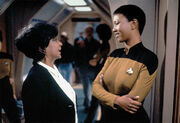
Nichols with Mae Jemison on the set of "Second Chances" in 1993.
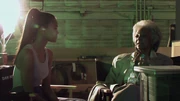
Nichols talking to Zoe Saldana on the set of Star Trek.
Her role as Uhura on Star Trek was one of the first times that an African-American actress portrayed a non-stereotypical role on television. Previously, most African-American female characters on American television were depicted as maids or housekeepers, and Nichols' role helped break that barrier. Years later, Whoopi Goldberg told Nichols about excitedly watching Uhura, as a child, and telling her mother "Come quick! Come quick! There's a black lady on TV, and she ain't no maid!" She participated with series star William Shatner in another breakthrough, with American "episodic" television's first interracial kiss between fictional characters, as seen in the original series episode "Plato's Stepchildren". (Nancy Sinatra and Sammy Davis, Jr. had openly kissed months earlier in a musical-variety special broadcast by NBC on December 11, 1967, entitled Movin' With Nancy. However, preceding that was Uhura's peck on Christine Chapel's cheek in TOS: "What Are Little Girls Made Of?", airing on October 20, 1966.) [2]
She became the first African-American actress to place her handprints in front of Hollywood's Grauman's Chinese Theatre, along with the rest of the Star Trek cast. In 1992, she earned her star on the Hollywood Walk of Fame.
After meeting Nichols at a Star Trek convention in 1975, scientist Dr. Jesco von Puttkamer suggested that the actress take part in NASA's recruitment drive. Nichols took up the role in 1977, making recruitment and training films, and supervising astronaut recruits and hopefuls. She noted that the applicant count went from fewer than 100 a year to 1,649 within six months. Most of the recruits that she attracted were women or from ethnic minorities. For her efforts, Nichols was named as NASA's 'Woman of the Year' in 1979. Nichols is a good friend of former NASA astronaut Dr. Mae Jemison. Dr. Jemison was a fan of the original Star Trek and was inspired by Nichols when she decided to become the first African-American female astronaut. Jemison herself appeared in TNG: "Second Chances".
Several costumes and accessories worn by Nichols in Star Trek were sold off on the It's A Wrap! sale and auction on eBay, including black Starfleet boots [3] and a grey undershirt. [4]
Personal Background
- Nichelle Nichols had decided to leave the original Star Trek series after the first season. Fed up with racist harassment and limitation, culminating with her learning that studio executives were withholding her fan mail, she submitted her resignation. She withdrew it when Dr. Martin Luther King, Jr. convinced her that her role was too important a cultural breakthrough to leave.
- Nichols is said to have wearied of the constantly used line: "Hailing frequencies open, sir." After having to open hailing frequencies 14 times, her exact words were "If I have to open hailing frequencies one more time I'll smash this goddamn console!" (The Trouble with Tribbles)
- Gene Roddenberry offered Nichols (his former lover) a very generous contract at the beginning of the first season: a flat rate of $1,000 per episode, which was higher than the salary of DeForest Kelley James Doohan and George Takei. Also, her contract didn't set a limit for the number of episodes to appear in, which the aforementioned performers' contracts all did. However, Desilu's legal department and the other producers soon got angry about this, especially since in the early episodes Uhura's role was basically uttering the "hailing frequencies" line a few times per episode, yet the studio payed her a thousands dollars for what was considered to be a "bit role". Soon, a new contract was negiotiated, with Nichols' salary reduced to $140 per day - which actually meant that if she needed to appear in all six or seven days of production, she would actually receive more money than with the previous offer. (These Are the Voyages: TOS Season One, Inside Star Trek: The Real Story)
- She made both her first (TOS: "The Corbomite Maneuver") and last (Star Trek VI: The Undiscovered Country) Star Trek appearances with DeForest Kelley. Both Nichols and Kelley filmed their first and last Star Trek scenes on 24 May 1966 and 2 July 1991 respectively.
- Her younger brother, Thomas Nichols, committed suicide on March 26, 1997 with the Heaven's Gate cult members in Rancho Santa Fe, California near San Diego.
- Nichols' son is actor Template:IMDb-name, who starred in the 1969 film Template:IMDb-name.
Appearances
As Uhura
- TOS:
- "The Corbomite Maneuver"
- "Mudd's Women"
- "The Enemy Within" (voice only)
- "The Man Trap"
- "The Naked Time"
- "Charlie X"
- "Balance of Terror"
- "What Are Little Girls Made Of?"
- "Dagger of the Mind"
- "The Conscience of the King"
- "The Galileo Seven"
- "Court Martial"
- "The Menagerie, Part I"
- "The Menagerie, Part II" (voice only)
- "Shore Leave"
- "The Squire of Gothos"
- "Arena"
- "The Alternative Factor"
- "Tomorrow is Yesterday"
- "The Return of the Archons"
- "A Taste of Armageddon"
- "Space Seed"
- "This Side of Paradise"
- "Errand of Mercy"
- "The City on the Edge of Forever"
- "Operation -- Annihilate!"
- "Catspaw"
- "Metamorphosis"
- "Friday's Child"
- "Who Mourns for Adonais?"
- "Amok Time"
- "The Changeling"
- "Mirror, Mirror"
- "The Deadly Years"
- "I, Mudd"
- "The Trouble with Tribbles"
- "Bread and Circuses"
- "Journey to Babel"
- "A Private Little War"
- "The Gamesters of Triskelion"
- "Obsession"
- "The Immunity Syndrome"
- "A Piece of the Action"
- "By Any Other Name"
- "Return to Tomorrow"
- "Patterns of Force"
- "The Ultimate Computer"
- "The Omega Glory"
- "Assignment: Earth"
- "Spectre of the Gun"
- "Elaan of Troyius"
- "The Enterprise Incident"
- "And the Children Shall Lead"
- "Spock's Brain"
- "Is There in Truth No Beauty?"
- "The Empath"
- "The Tholian Web"
- "For the World is Hollow and I Have Touched the Sky"
- "Day of the Dove"
- "Plato's Stepchildren"
- "Wink of an Eye"
- "That Which Survives"
- "Let That Be Your Last Battlefield"
- "Whom Gods Destroy"
- "The Mark of Gideon"
- "The Lights of Zetar"
- "The Cloud Minders"
- "Requiem for Methuselah"
- "The Savage Curtain"
- TAS:
- "Beyond the Farthest Star"
- "One of Our Planets Is Missing"
- "The Lorelei Signal"
- "More Tribbles, More Troubles"
- "The Infinite Vulcan"
- "The Magicks of Megas-Tu"
- "Once Upon a Planet"
- "The Terratin Incident"
- "The Time Trap"
- "The Slaver Weapon"
- "The Pirates of Orion"
- "Bem"
- "The Practical Joker"
- "Albatross"
- "How Sharper Than a Serpent's Tooth"
- "The Counter-Clock Incident"
- Star Trek films:
- DS9: "Trials and Tribble-ations" (archive footage)
As other characters
- Computer voice in TAS: "The Lorelei Signal", "The Infinite Vulcan"
- Davison in TAS: "The Lorelei Signal"
- Briel in TAS: "The Terratin Incident"
Other media
Nichols has provided voice work as Uhura for two Star Trek games:
Books authored
- Beyond Uhura
- Saturn's Child
- Saturna's Quest
- The New Voyages 2 (anthology)
- "Surprise"
| Star Trek: The Original Series regular cast |
|---|
| Starring: William Shatner • Leonard Nimoy • DeForest Kelley |
| Co-Starring: Majel Barrett • James Doohan • Walter Koenig • Nichelle Nichols • George Takei • Grace Lee Whitney |
| Star Trek: The Animated Series regular cast |
|---|
| Starring: William Shatner • Leonard Nimoy • DeForest Kelley |
| Co-Starring: Majel Barrett • James Doohan • Nichelle Nichols • George Takei |
External links
- Uhura.com - official site
- Nichelle Nichols at Wikipedia
- Template:IMDb-link
- Nichelle Nichols at TriviaTribute.com
- Interview at the EmmyTVLegends.org

